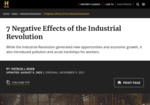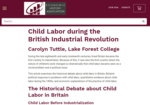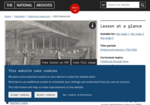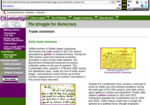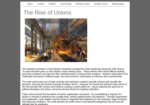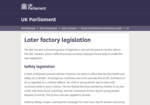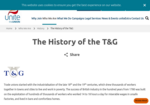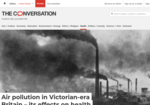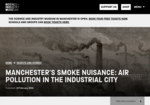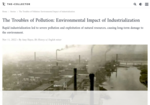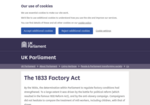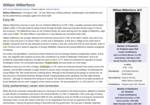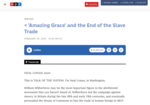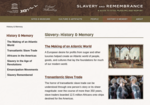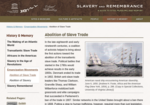Agricultural Revolution (Great Britain)
Industrial Revolution (Great Britain)
Industrial Revolution Trade Unions
Industrial Revolution Pollution
Industrial Revolution British Legislation
Mary Wollstonecraft
William Wilberforce
Simon Bolivar
While the Industrial Revolution created economic growth and offered new opportunities, that progress came with significant downsides, from damage to the environment and health and safety hazards to squalid living conditions for workers and their families.
Information included refers to the textile industry in Great Britain, Social Effects of the Industrial Revolution, and Connections between the Industrial Revolution and the expansion of suffrage.
This article examines the historical debate about child labor in Britain, Britain’s political response to problems with child labor, quantitative evidence about child labor during the 1800s, and economic explanations of the practice of child labor.
In 1833 the Government passed a Factory Act to improve conditions for children working in factories. However, the passing of this act did not mean that the mistreatment of children stopped overnight.
This is an archived page from The National Archives website. Use the web.archive.org... URL in citation BUT do not reference WaybackMachine in website or webpage names. Use original page info. (See Mr. Lloyd if you have questions)
For citation, publication date: Fall 2012; editor: Glenn Kranking; website name: 19th Century Urban Working Class
The 1833 Act was a pioneering piece of legislation, and set the pace for further reform. This did, however, prove a difficult process as many employers found ways to evade the new regulations.
The origins of the trade union movement can be traced to the time of the industrial revolution, which transformed Britain in the 18th and 19th century from an agrarian and rural society to one which was based on industrial production in factories, textile mills and mines.
Workers realised they could only fight ruthless employers and inhuman working conditions by banding together, and so trade unions were born - and fiercely opposed by the owners of industry.
Excrement from some of the infrastructures with latrines were to be collected in cesspits under buildings and/or drained into rivers.6 In many cases, this meant draining sewage into major water supplies which frequently were also sources for drinking water.
NOT CURRENTLY AVAILABLE This article provides the first rigorous estimates of how industrial air pollution from coal burning affects long-run city growth. I introduce a new theoretically grounded strategy for estimating this relationship and apply it to data from highly polluted British cities from 1851 to 1911.
See page 524-525 (also available printed, on cart): "Here we are in the Metropolis breathing coal-smoke, begrimed by coal-smoke, and sometimes involved in that 'pitchy cloud of infernal darkness,' through which we see the sun dimly as a fiery red ball. Our buildings are made hideous by coal-smoke, being patched with horrid streaks of black ..."
See page 48, 2nd column (also available printed, on cart): "Industry is spoiling and soiling our planet. Chemical produce poisons the water, the dross from different works and factories covers the country, quarries split up the picturesque slopes of valleys, black coal smoke dulls the verdant foliage and the azure of the sky, the drainage of large cities turns our rivers into sewers, whence emerge the germs of typhus."
In the early industrial age, Britain was famous for its dark satanic mills. And the industrial revolution, which did so much to raise income and wealth, depended almost entirely on one fuel source: coal. Coal supplied domestic hearths and coal-powered steam engines turned the wheels of industry and transport.
The formation of all habits of cleanliness is obstructed by defective supplies of water. The annual loss of life from filth and bad ventilation are greater than the loss from death or wounds in any wars in which the country has been engaged in modern times.
A study of European history, among other things, this book appears to describe effects upon environment created by the Industrial Revolution (Chap 3; pp 25-44). Written by Jacob Salwyn Schapiro
Industrialisation in 19th-century Manchester had world-changing effects, but it also polluted the city and caused massive health problems for its inhabitants. Can the environmental challenges and solutions of the first industrial city offer insight into the air pollution dilemmas confronting us as we face the current climate crisis?
The Great Smog of 1952 was an eye-opening disaster that caused a thick blanket of smog to cover the entire city of London. Between December 5 and December 9, 1952, smog consumed the streets of London ... due to a combination of coal burning and an anticyclone weather event ...
The dominant contributor to London’s historic air pollution was coal burning. Throughout the 18th and 19th centuries, the coal industry in Great Britain expanded rapidly; driven not only by economic growth, but also by an expanding labour force and improved distribution networks
"The inevitable tendency of our Manufacturing and Commercial activities to concentrate our population in large masses ... has other results ... chief of these are the accumulation of solid, liquid, and gaseous excreta, resulting either directly or indirectly from human and animal life, and also the gaseous emanations from the various manufacturing and culinary processes so largely carried on where human beings are so densely massed together ..."
A listing of key dates and legislation leading toward the reformation of British society and working conditions in the 19th century.
A summary of well-intentioned legislation designed to protect the rights of children and workers passed between 1802 and 1815. The flaw with all of these acts was lack of enforcement.
"In 1832 Michael Sadler secured a parliamentary investigation of conditions in the textile factories. The evidence printed here is taken from the large body published in the committee's report and is representative rather than exceptional. It will be observed that the questions are frequently leading; this reflects Sadler's knowledge of the sort of information that the committee were to hear and his purpose of bringing it out."
The following testimonies are drawn from the records of the Sadler Commission (1832).
"By the 1830s, the determination within Parliament to regulate factory conditions had strengthened. To a large extent it was driven by the battle for political reform (which resulted in the famous 1832 Reform Act), and by the anti-slavery campaign. Campaigners did not hesitate to compare the treatment of mill-workers, including children, with that of slaves."
"On the 4th July 1838 at Huskar pit in Silkstone Common near Barnsley, twenty six children lost their lives in one tragic accident. This increased public concern and made it become more urgent to set up the Commission"
"In 1842 a Report by a Royal Commission on the employment of women and children in mines caused widespread public dismay at the depths of human degradation that were revealed... The Mines and Collieries Bill, which was supported by Anthony Ashley-Cooper, was hastily passed by Parliament in 1842. The Act prohibited all underground work for women and girls, and for boys under 10."
"The 1848 Public Health Act was the first step on the road to improved public health. One of the individuals who played an important role in its creation was Edwin Chadwick, a social reformer."
The "demand for housing an abundance of workers near factories... led to the rapid growth of urbanization resulting in poorly constructed houses with little to no space. Houses were made without technology such as proper sewage and fresh-water. Living in such poor conditions, major diseases would spread quickly endangering a lot of England’s population."
"The views expressed by industrialists that mass education was vital to the nation's ability to maintain its lead in manufacture carried considerable weight in Parliament. A Bill which met many, but not all, of the League's wishes was drafted and introduced by W. E. Forster, and quickly passed."
"In order to provide and maintain schools where existing elementary education was insufficient, this Act divided England into districts under the management of locally elected school boards... The Act allowed school boards to rule that children aged between five and 13 should attend school. It did not make all education free or compulsory but did order, for the first time, that a school be placed in reach of every child."
"The following is a summary of legislation which followed the Education Act of 1870."
Ireland was to be turned upside down to shake every last penny out of the pockets of property owners and former tax payers still listed on the rolls. Rate collectors seized livestock, furniture, or anything else of value including the clothes and tools of former tax payers who had become homeless paupers.
The Great Famine in Ireland began as a natural catastrophe of extraordinary magnitude, but its effects were severely worsened by the actions and inactions of the Whig government, headed by Lord John Russell in the crucial years from 1846 to 1852.
Before it ended in 1852, the Potato Famine resulted in the death of roughly one million Irish from starvation and related causes, with at least another million forced to leave their homeland as refugees.
Between 1849 to 1851, 4,000 Irish Famine orphan girls were brought to Australia from workhouses across Ireland.
Wilberforce was a deeply religious English member of parliament and social reformer who was very influential in the abolition of the slave trade and eventually slavery itself in the British empire.
"So enormous, so dreadful, so irremediable did the [slave] trade's wickedness appear that my own mind was completely made up for abolition. Let the consequences be what they would: I from this time determined that I would never rest until I had effected its abolition."
Page approved and suggested by Mrs. McGary. Citation information -- Date of publication: 2007; no author or editor; Website name: 2007 Schools Wikipedia Selection
"When [Wilberforce] spoke against slavery in his 1789 speech to the English House of Commons, Wilberforce was swimming upstream. He didn’t hold back. He presented his reasons with airtight logic and the use of rhetorical questions that bordered on snarky.
"Abolitionism was one of Britain’s first lobbying movements... Abolitionists succeeded in mobilizing unprecedented public support... Although the British Parliament outlawed slavery in 1807, a quarter of all Africans who were enslaved were transported across the Atlantic after this date."
"The Society of Friends (or Quakers) campaigned against the transatlantic slave trade for many years... In 1787, along with Thomas Clarkson and Granville Sharp, [they] helped found the Committee for the Abolition of the Slave Trade... In spite of some initial reluctance, William Wilberforce, MP for Hull, took up the campaign, and he made his first anti-slavery speech on 12 May 1789."
This is a transcript [and audio recording] of an interview with Eric Metaxas, the author of "Amazing Grace: William Wilberforce and the Heroic Campaign to End Slavery" and Michael Apted, the director of the movie, "Amazing Grace." They discuss the history and details of what Wilberforce and his allies accomplished and the danger and difficulty in what they did.
"Britain’s transatlantic slave trade spanned three centuries, reaching its height in the 18th century. Rebellions and resistance by enslaved Africans, and the abolition movement in Britain, led to Acts of Parliament that abolished the trade in 1807 and enslaved labour in the colonies from 1833."
"British anti-slave trade leaders like Thomas Clarkson, Granville Sharp, and William Wilberforce mobilized both grassroots and elite campaigns that succeeded in Parliament’s ban of the trade in 1807."
Describes the role of numerous individuals involved in the Abolition movement and eventual end to Slave Trade in Great Britain and it's colonies. "Learn more about the campaigns to end slavery in Britain, and how the legacies of enslavement still shape the world around us today."
"In the late eighteenth and early nineteenth centuries, a coalition of activists helped to bring about the first actions toward the abolition of the transatlantic slave trade. Political battles that started in the 1780s would achieve results in the early 1800s... Putting a stop to human trafficking, however, required more than just legislation, it needed enforcement and international cooperation."
"It is still the case that Wilberforce remains the only household name of a history that begins during the reign of Elizabeth I and ends in the 1830s. There is no slave trader or slave owner, and certainly no enslaved person, who can compete with Wilberforce when it comes to name recognition."
Provides history of the slave trade by Europeans from Africa, east to the Americas. "Determined to extract wealth, ... European powers sought labor from Africa, launching a tragic era of kidnapping, abduction, and trafficking that resulted in ... a catastrophic genocide killing millions ... and [enslaving millions more] African People."
In 1825, the "Republic of Bolivia" was created in honor of the inspirational leader Simón Bolívar, hailed by many as El Libertador (The Liberator).
Simon Bolivar was one of the most powerful figures in world political history, leading the independence movement for six nations (an area the size of modern Europe), with a personal story that is the stuff of dramatic fiction.
Simon Bolivar lived a short but comprehensive life. History records his extraordinary versatility. He was a revolutionary who freed six countries, an intellectual who argued the problems of national liberation, a general who fought a war of unremitting violence. He inspired extremes of devotion and detestation.
Website name is ~ Latin American Studies --- the author is Dr. Antonio Rafael de la Cova --- Publication date is 15 December 1997
